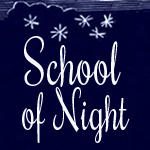Professor Michael Delahoyde presents School of Night, interactive classes in forbidden Shakespeare studies. Watch the videos: “This well-painted piece”: Renaissance Art in The Rape of Lucrece and The Winter’s Tale As Tudor Family Allegory.

Interview with Katherine Chiljan
The First Folio has been called “incomparably the most important work in the English language.” Published in 1623, seven years after William Shakespeare’s death, and assembled by members of his theater, it is the earliest collection of Shakespeare plays. There are curiosities about the First Folio that make some scholars wonder if it has another, secret, history. Katherine Chiljan, author ofShakespeare Suppressed: The Uncensored Truth about Shakespeare and his Works, joins us to investigate.

Interview with Sabrina Feldman
Ben Jonson and other writers of Shakespeare’s time satirized a playwright-actor who stole their words and passed them off as his own. In epigrams and plays they attacked the plagiarist, who made a career from their works. Dr. Sabrina Feldman argues that the lampoons take aim at one highly successful playwright: the author of the Shakespeare Apocrypha. Allan Armstrong continues his conversation (begun in episode 4) with Sabrina Feldman, author of The Apocryphal William Shakespeare.

Interview with Richard Whalen
Does Shakespeare's bleak tragedy of jealousy and betrayal have roots in Commedia dell'Arte? Richard Whalen, co-editor of the Oxfordian edition of Othello, reveals the play's surprising comic underpinnings, and addresses the mystery of Shakespeare's knowledge of Italian comedy. How did Shakespeare come to be so deeply influenced by a style of theater that was not performed in England during his most active writing years?

Interview with Sabrina Feldman
What is your favorite Shakespeare play – Locrine? maybe The London Prodigall? Or perhaps the superhit Mucedorus, reprinted in at least 17 quarto editions, more than any other extant play of the era. These dramas and more are part of the “Shakespeare Apocrypha,” works that were attributed to William Shakespeare during the 17th century, in several cases during the Stratford man’s lifetime. In this episode, Allan Armstrong interviews Dr. Sabrina Feldman, author of The Apocryphal William Shakespeare, to discover the story behind these intriguing but nearly-forgotten plays that have been kicked out of the Shakespeare Canon.

Interview with Earl Showerman
Does A Midsummer Night’s Dream satirize Queen Elizabeth’s courtship with the Duc of Alençon, brother to King Henry III of France? Join Dr. Earl Showerman for a spirited visit to the court of the Virgin Queen, where politics, love, image-making and theater weave together in a confused tangle, and discover links from this colorful time to Shakespeare's magical comedy.

Interview with Tom Regnier
Can the intricacies of Elizabethan Law shed new light on the tragedy of Hamlet, Prince of Denmark? In this fascinating interview with attorney Tom Regnier, we look at how Shakespeare uses the law in the plays and Sonnets, why scholars and lawyers have claimed that Shakespeare had legal training, and — surprisingly — how themes of English law run throughout the play Hamlet.

Interview with Bonner Miller Cutting
We have few records from the life of William Shakespeare. Most are related to lawsuits or the purchase of property. The most personal document that remains is his Last Will & Testament.Researcher Bonner Miller Cutting looked at some 3,000 wills from Shakespeare’s day, and talks about how Shakespeare's fits into the picture.

